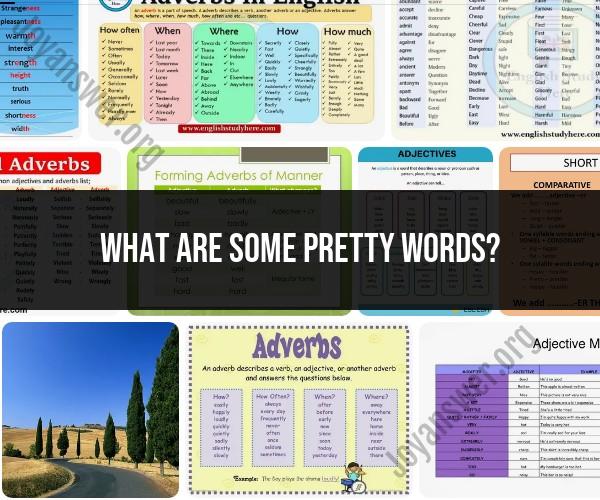What are some pretty words?
Beauty in language often lies in the way words sound, their meanings, or the emotions they evoke. Here are some words that are often considered "pretty" for various reasons:
Serendipity: This word conveys the idea of pleasant surprises and fortunate discoveries.
Ethereal: It describes something delicate, light, or otherworldly.
Mellifluous: Referring to a smooth and sweet-sounding voice or music.
Luminescence: Evoking the gentle, soft glow of light.
Effervescent: Suggesting bubbly and lively enthusiasm.
Cacophony: While not pretty in sound, it beautifully conveys a jarring, chaotic, and discordant mix of sounds.
Sonorous: Describing deep, rich, and resonant sounds.
Ineffable: Often used to describe something too wonderful or beautiful to be expressed in words.
Aurora: Reminding one of the stunning natural light display in the Earth's sky.
Petal: Conjuring images of delicate flower petals.
Halcyon: Often used to describe a period of peace, tranquility, or happiness.
Ephemeral: Reflecting the idea of something fleeting and short-lived.
Serenity: Conveying a sense of calm and peace.
Gossamer: Suggesting something delicate, fine, and almost translucent.
Crepuscular: Describing the period during twilight or dawn.
Sapphire: Referring to a bright blue gemstone.
Velvet: Eliciting a sense of softness and luxury.
Quixotic: Evoking the idea of romantic and idealistic but impractical pursuits.
Incandescent: Describing something glowing or shining brightly.
Resplendent: Signifying something shining brilliantly and impressively.
These words, along with many others, are appreciated not only for their meanings but also for the imagery and emotions they invoke when spoken or written. Language has a remarkable capacity to evoke feelings and convey nuanced concepts, and these "pretty words" are a testament to that.
Discovering the Beauty of Language: Pretty Words to Delight In
Language is a beautiful and expressive tool. It can be used to communicate our thoughts, feelings, and ideas in a clear and concise way. But language can also be used to create art and beauty.
There are many pretty words in the English language. Some of these words are simply beautiful in their sound, while others have beautiful meanings. Here are a few examples:
- Aesthetics: The study of beauty and taste.
- Captivating: Holding someone's attention completely.
- Celestial: Of or relating to the sky or heavens.
- Ethereal: Light and delicate, especially in a way that is charming or exciting.
- Exquisite: Extremely beautiful and delicate.
- Felicity: Great happiness or good luck.
- Glimmer: A small, faint light.
- Heavenly: Feeling or seeming to be very happy or wonderful.
- Luminous: Shining brightly or softly.
- Melodious: Sweet and pleasant to the ear.
- Serendipity: The occurrence and development of events by chance in a happy or beneficial way.
- Tranquil: Peaceful and quiet.
Exploring the Aesthetics of Words: Captivating and Lovely Terms
The aesthetics of words is the study of the beauty of language. It considers how words sound, how they look, and how they feel in the mouth.
Some words are simply beautiful in their sound. For example, the word "celestial" has a soft and flowing sound that evokes images of the sky and the stars. The word "ethereal" has a light and airy sound that evokes images of fairies and dreams.
Other words are beautiful in their meaning. For example, the word "felicity" means "great happiness or good luck." The word "luminous" means "shining brightly or softly." The word "serendipity" means "the occurrence and development of events by chance in a happy or beneficial way."
The Art of Word Selection: How Words Evoke Emotions
The art of word selection is the ability to choose the right words to convey your thoughts and feelings in a clear and effective way. It is also the ability to choose words that are beautiful and evocative.
When we choose our words carefully, we can create a deeper impact on our listeners or readers. We can evoke emotions such as joy, sadness, anger, or fear. We can also create a sense of beauty, mystery, or suspense.
For example, if we want to describe a beautiful sunset, we might choose words like "brilliant," "flamboyant," and "dazzling." If we want to describe a feeling of sadness, we might choose words like "melancholy," "gloomy," and "despondent."
Words That Paint Pictures: Beauty in Vocabulary
Some words are so evocative that they can paint a picture in our minds. For example, the word "glimmer" can evoke an image of a faint light in the darkness. The word "celestial" can evoke an image of the stars and planets. The word "ethereal" can evoke an image of a fairy or a dream.
When we use evocative language, we can bring our stories and descriptions to life. We can help our readers or listeners to visualize what we are talking about.
For example, instead of saying "The woman was sad," we could say "The woman's eyes were filled with melancholy." Instead of saying "The house was old," we could say "The house was creaky and decrepit."
Incorporating Pretty Words into Everyday Communication
We can incorporate pretty words into our everyday communication in a number of ways. For example, we can use them to describe our surroundings, to express our feelings, or to tell stories.
We can also use pretty words to complement others or to make them feel good. For example, we could say to a friend, "Your eyes are luminous." Or we could say to a colleague, "You have a felicitous way of expressing yourself."
Using pretty words in our everyday communication can make our language more interesting and engaging. It can also help us to connect with others on a deeper level.
So next time you are communicating with someone, take a moment to think about the words you are using. Choose words that are clear, concise, and evocative. Choose words that will paint a picture in the mind of your listener or reader. And choose words that are pretty and delightful.











